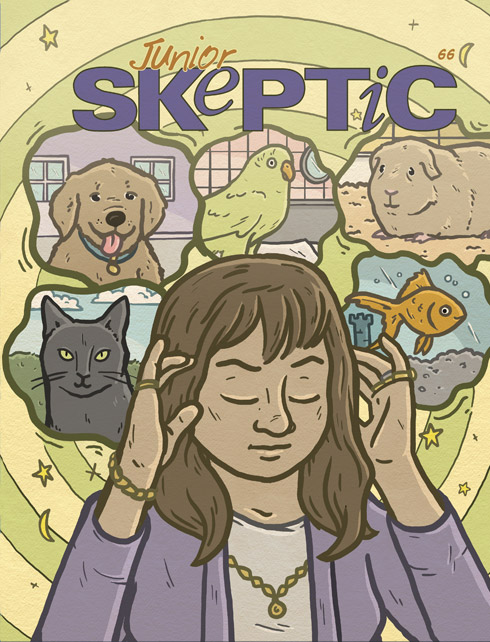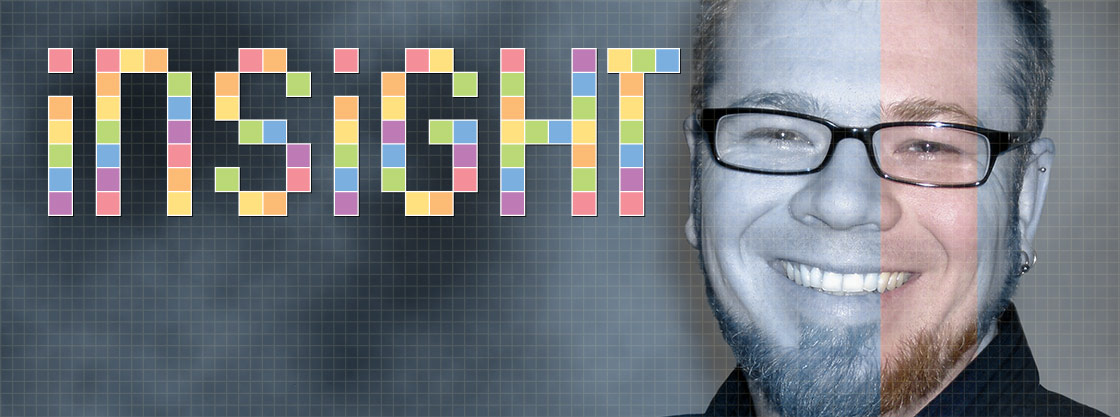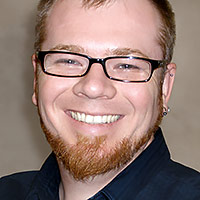Recently I attended a dinner party as the guest of a new friend among people who’ve known each other for decades. After dinner, the conversation turned to a story that had puzzled and intrigued the hosts. They were excited to share a YouTube video about a black leopard whose behavior was allegedly improved through the intervention of an “animal communicator” (pet psychic).

Cover art for Junior Skeptic #66, bound inside Skeptic Vol. 23, No. 1. Illustration by Jacob Dewey.
Now, this is a literate, philosophical bunch. They like debating, speculating, and devil’s advocacy, so they didn’t much mind that my friend found the claims of the video preposterous. After some lively verbal fencing, she turned to me in exasperation and said, “We have a professional skeptic right here! Daniel, you write about this stuff for a living. What do you think?”
Well, I had thoughts. But I said the minimum: that I hadn’t yet looked professionally at the specific topic of pet psychics, and that the video was a constructed narrative whose claims we should neither accept nor reject without checking. (Then I went away and actually did spend weeks researching and writing a lengthy critique of pet psychics for the pages of Junior Skeptic.)
What I said was true. But it’s also true that I might have contributed more to that conversation in other periods of my life.
Saying Stuff
I’ve come to notice how often I’ve felt myself impatiently waiting for an opening to jump into a paranormal conversation and explain something about the topic at hand. I’m polite, of course, and usually I don’t mean to intervene or change anyone’s mind—not in a social setting. It’s just that I love these topics, and I know something about them, and I want to share what I’ve learned.
“When you’re in love,” said Carl Sagan, “you want to tell the world.” He was talking about science, which is a bit different from my primary passion. I’m specifically passionate about the study of paranormal, pseudoscientific, and fringe claims— science-informed scholarly understanding of topics that are conceptually weird but (in aggregate) so commonplace as to be almost universal. (We’ll just call these topics “the paranormal” for short.)
Wanting to share isn’t a bad impulse. Problem is that I wind up not listening—not as deeply as I could, anyway.
I’m becoming more aware that explaining stuff comes with costs, even when it’s received in the spirit I intend (often it isn’t). Sometimes people I care about feel reluctant to fully share matters of importance to them. “I feel weird talking to you about this!” laughed one friend the other day. Well, heck. On a personal level, that’s not what I want.
But I’m writing this to put my thoughts in order about another cost, a cost to my work.
Shhhh…
For better or worse, my habit of saying stuff has been disrupted during a challenging period in my personal life—a period when I’ve needed connections with friends a lot more than I’ve needed to hear myself talk about skepticism.
And so, quite by accident, I’ve found myself rediscovering the skeptical virtue of seriously just shutting up for a while.
Being quieter has renewed and sharpened my awareness of a deep truth about humanity: the paranormal is everywhere. It isn’t a sideshow. It’s right there on the main stage, a central part of the human experience. Paranormal beliefs are folded into the daily lives of billions of people, shaping the ways they navigate the world. I see it every day in the people I care about. The paranormal is meaningful to people.
Paranormal beliefs don’t exist in isolation, merely true or false. People use them, embody them, fold them into the fabric of who they are. Paranormal beliefs are among the tools people reach for as they navigate grief, find community, express love for their families, find agency, and seek meaning.
The primary goal of my work in skepticism is deep understanding of those beliefs. But I don’t always understand them—not as well as I want to. And when I’m busy explaining what I do know, I miss opportunities to understand better, to learn things I don’t know, things I don’t know I don’t know, and—most important—things I can’t know. Not personally. Not without help.
Blinders
Here’s the thing: absence of belief limits my vision. All around me are people with experiences I simply cannot have. They see things I can’t see, live in worlds I can’t visit. A difference of belief is a chasm of otherness, and I want to bridge those wherever I can.
I want to know how these things look from the inside, how these beliefs and experiences feel to smart, critical, good-hearted people with perspectives I don’t share. We can’t truly know what we’re talking about as skeptics if we don’t fully understand what the other guy is trying to say. I’ve urged skeptics to embrace the value of intellectual vertigo—the experience of opening ourselves to the persuasiveness and reasonableness of weird beliefs to such an extent that we can glimpse the alternate reality the other guy sees. But that vertiginous viewpoint isn’t always easy to achieve. Sometimes it’s like trying to peer through a brick wall.
My blindness is uneven, my vision patchy. I can see further into some topics than others. It’s one reason I’ve given emphasis to cryptozoology in my skeptical career. I know, or at least remember—ephemeral as memory may be—what it feels like to believe there’s a Bigfoot, to feel certain that sea serpents lurk out there to be discovered. Other beliefs I can understand only by analogy–or, perhaps, by listening to someone who experiences that belief from the inside.
We’ll take an extreme example, not from my own social circle so far as I know: what does it feel like to think that the Earth is flat? I literally have no idea, no more than I know what it is like to think that triangles are round. And so my articles on that topic answer the easy questions: what do Flat Earthers say, and are those claims correct? (Spoiler: they’re not.) But the harder questions hang there, waiting to be known.
Understanding Matters
For all that this post is about being quieter more often, at the end of the day I do want to say stuff—sometimes loudly. I’m in favor of education, outreach, and, yes, skeptical activism. I often downplay arguments from harm as a justification for scientific skepticism, but the fact remains: “when paranormal beliefs burn out of control, people get hurt.” Sometimes it matters that someone tries to do something. (PDF)
But outreach requires communication, and communication requires understanding. That understanding is most vital on exactly those topics on which skeptics most wish to pursue educational outreach, to intervene, such as the psychic industry or alternative medicine. In professional health care, “cultural competence” is an ethical issue. Health care workers wish to understand and reduce cultural barriers to access to care—barriers that could otherwise cause harm to patients. For our part, skeptics routinely critique ineffective, unproven, exploitative, and unsafe treatments in alternative medicine, but we do not always succeed in communicating with the people who could most benefit from hearing the perspective of science-based medicine. We know that we don’t, because they tell us so.
As former New Age author Karla McLaren warned skeptics in a 2004 critique,
Why…do I have to spend so much time translating on the skeptical sites I visit-or just skipping over words like scam, sham, quack, fraud, dupe, and fool? Why do I (the sort of person who actually needs skeptical information) have to see myself described in offensive terms and bow my head in shame before I can truly access the information available in your culture?
Naturopathy critic Britt Marie Hermes recently echoed this sentiment in a Guardian story, noting that the “grumpy” cultural tone of the skeptical literature can be off-putting for those in need of information, and that skeptics may not always understand the motivations that draw patients and practitioners to alternative medicine in the first place. Claims, beliefs, practices—these are all about people.
“If we want to successfully communicate with someone,” McLaren explained, “we’ve got to understand not just their language, but the cultural context from which their language springs.” Without that understanding, “the skeptics have not yet been able to speak in a way that can be heard.”
Projects, goals, and outcomes vary, but I think this is typically still the case on most topics that skeptics address. Sometimes that’s fine—a lot of my work is intended for skeptics or interested neutral readers, not as outreach. But sometimes we want to be heard by the people who are least open to our information, who are also the people we may least understand. That is a problem.
And so I’m thinking about that. And I’m listening.











Conversations (or “listening”) seem to be the in-thing. What is the proximate explanation for this trend? The downside is less focus on one’s own position, less detail and inability to draw a conclusion. Is it that we really can’t figure out, let alone prove, whether vitalism is really false and materialism prevails in the ultimate worldview? After all, trying to debunk the paranormal IS materialism. Just my opinion, of course.
Well it is heartening to see a skeptic with a higher-than-usual degree of self awareness and less of the moral self-righteousness and contempt which so often puts me off their otherwise really interesting material. Often they seem less like open minded enquirers and more like preachy cynics trying to put their stupid, uneducated audience on the right track, as if talking to children. I too was struck by Britt Marie’s acknowledgement that there was a bigger picture that so-called skeptics often miss, and this is a fantastic piece too. So glad I read it. Feel like things might be changing and necessary bridges might yet be built between the scientific and alternative worlds.
Excellent piece, excellent comments. The article and comments highlight the priority, patience, work, and authentic empathy I need to cultivate in thought, behavior, and heart.
Those contemporary absurdities which make the hijacking of our better selves too easy have worn thin. I am a very flawed work-in-progress but the better human I want to become puts the humanity of people with those whom I most disagree first. This does not excuse sociopaths and silly manipulators – but I try to understand them. It is in the interest of those with the most financial power to cloak their doings through incessant pitching shiny or stinky distractions and have us behave as if we were on a vulgar television ‘reality’ show. Oxymoronic morons on oxycontin. Or something.
I am afraid that I am not so understanding when presented with bad thinking. I have problems with “absence of belief limits my vision.” The presence of beliefs clouds one’s vision.
Daniel Loxton’s INSIGHT: The sceptical virtue of seriously just being quiet, is an important warning that there are times when we skeptics should just keep our mouths shut. I am a long-standing member of the Australian Skeptics, and for about ten years I served as the secretary of one of the State groups: The Hunter Skeptics (“Hunter” being a region in NSW, named after the Hunter River, and not meaning “hunting” in any way!).
At our meetings, I always brought in a large mounted poster saying: “SEEK THE EVIDENCE” and propped it up at the front of the room to remind those present that any assertion they made during discussions required locatable, verifiable evidence to support their claims in discussions.
But, as an ordinary citizen in day-to-day participation in my community, I admit that I sometimes fell into the trap of making dogmatic statements, not always supportable by views commonly held by the community at large.
On one occasion, many years ago, at a Christmas Day celebration at my brother-in-law’s home, I made a big mistake. My brother-in-law (since deceased) was deeply religious (whereas I am not at all “religious”, not being a believer in “God”, Jesus, miracles, etc.), and prior to the Christmas dinner, he invited all of us to join him in reciting the customary saying of “Grace”. I just sat silently, but as he then went on at length to remind all of us, that there were many millions of people around the globe who were starving, while we were about to indulge in a sumptuous Christmas dinner. At the end of his little speech, I blurted out that perhaps we shouldn’t be indulging in the festive board in front of us, but rather we should be out in the streets trying to help the lonely, starving and homeless by offering them food, etc.
This little speech of mine caused a brief embarrassing silence, and I instantly regretted making it. We then all got on with the meal and there was much subsequent conviviality. But the issue here was that I should have simply kept my mouth shut! I was a guest in my brother-in-law’s home. What I said was NOT appropriate for the occasion. I still regret making my little speech.
There are times and occasions when we skeptics should just SHUT UP in the context of specific occasions when offence and affront could be caused.
Many years have passed and I have since well learned that there are times and circumstances when it is better to stay nothing rather than alienate the opinions, sensitivities and respect of other people.
I enjoyed the article and the comments. Of course we’ll never understand everything, but listening, trying to understand and accepting could bring us closer together.
The word, skeptic, has always meant having doubts while keeping an open mind. The old saying that we have two ears and only one mouth still holds true. I seem to recall that as a child many of the things that I now know were false seemed to be true. Much of what we now consider sound scvientific thinking would have been deemed mad only a matter of years ago.
If we are truly evolving as people, what we thought and believed a few years ago could well have changed dramatically.
Thanks. I’ve been doing this with religion but I’ll now try to listen, while keeping my expression normal, to other paranormal opinions. It does take an effort.
Thanks Daniel, well said. I have also come to see the value of arguing less and listening more. I recently reconnected with some childhood friends. We grew up together in a very different environment than I live in now, and whereas I moved away and came to steer my contrarianism more to skepticism and understand my own atheism, they became more enmeshed in religion. They believe in a literal heaven and hell and in the devil and witchcraft. These are people I still love deeply, though I don’t understand them any more than they understand me.
In my visits with these friends we tread carefully around our differences and listen respectfully. I don’t expect any of us will be converted, but there’s room for understanding to happen. In this very divided country, we do ourselves no service by walling ourselves off. Earlier in life I never would have believed this. But now and then I find I really can just shut up and listen for a change.
In grad school, one of the best lessons I had was from a professor in a censorship class. He assigned us to take a position we cared passionately about and then write a pursuasive paper arguing the merits of the other side. It was one of the harder papers I had to write, but you can’t effectively argue your own side without being able to articulate the real beliefs of your opponent rather than the caricutures you’ve set up in you own head. And that means you have to listen carefully.
Excellent insight, and definitely NOT “too long of a pitch”! I think this is a major problem with most sceptical thinking. As the saying goes, you’ll catch more flies with honey than vinegar.
Very good article. I am generally a quiet person and have found that being quiet and just listening is a great quality that people respond well to. Its is easier to ask questions and listen than it is to argue your point. Sometimes if you ask enough questions and honestly listen you can get them to start thinking more openly and even convince them more about your side of the argument. Its easier to help them along their own journey towards truth than to beat them over the head with facts. Well written good insight hope to see more articles like it. Thank you.
It looks like the idea that you quote here from McLaren is beginning to sink in. I notice many columns here at skeptic and in similar forums are being written from a communicative standpoint, not one where the mocking of beliefs in UFOs or bigfoot is basically outright.
I wish that trend would continue into the general public, specifically social media, where most people seem way more interested in just bashing each other like they’re the token dick on a reality show than trying to have a conversation. Ideas don’t upload that way.
Daniel, for someone who wants to listen more, say less, THIS was too long of a pitch.
YES!